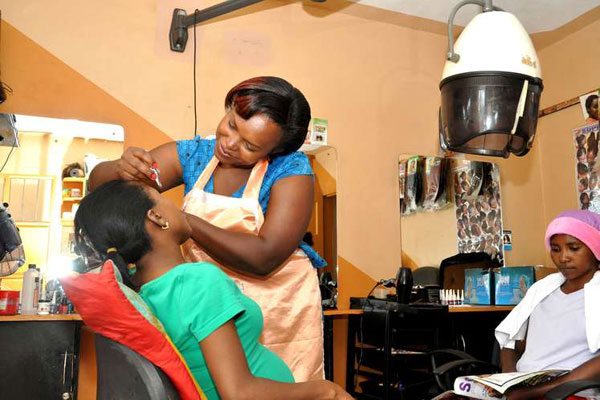
Starting Salon Business: “I grew up in Kibera. I didn’t have many role models,” starts Milkha Kihara.
As she tells her story, she stops every so often to wipe the tears that the painful memories bring to her eyes. She had the odds stacked up against her from the very beginning. After high school, her parents couldn’t afford her college fees since she had siblings who were still in school.
“I ran away from home and got a job working as a house help for a family here in Nairobi. My first salary was Sh800,” she recalls.
At the time, she didn’t know what she wanted to do with herself. She just wanted to get away and make a life for herself. It was while looking after her employer’s little girl that she discovered she enjoyed making her hair. She began nurturing this talent. She would make this girl’s hair, her friends’ and sometimes her employer’s hair.
Starting Salon Business: SAVING TOWARDS A DREAM
“After four years and three households working as a house help, my salary had risen to Sh4, 000. I could save a little but it still wasn’t enough to pay for a course at the beauty college I had identified in Kawangware,” she says.
She shared her dream with her employer who happily sponsored her training in hair and beauty therapy. Finally, in 2009, Milka found herself living what she had thought was her dream, working as a beautician at a salon.
“It definitely was an upgrade from the housework but the pay was disappointing. As a trainee, I was earning the same Sh4, 000 I had earned as a house help. Only this time, I had to pay my rent, buy food and foot all my bills.”
SEE MORE: I beat farming failure to make Sh. 100,000 monthly from brick jikos
She was barely making ends meet but perhaps because she knew what truly lacking felt like, she kept her eyes on the prize. When she began making more money, instead of adjusting her spending upwards, she started saving the extra money for her dream. By 2012, she had saved Sh100,000.
“I had bought some salon equipment. I intended to use my savings to pay rent and buy a few pieces of furniture. When I went hunting for space, I found a salon on sale. I jumped at the opportunity,” she says.
She used all her savings to pay for half the sale price and after agreeing on a payment schedule for the rest of the money with the salon owner, Milka got down to work.
“I had quit my job and used up all my savings. This just had to work.”
She had moved with some of her clients so she didn’t have a problem starting off. She, however, had a problem justifying her high prices. She opened her salon in a low-income neighborhood with the intention of attracting the kind of customers who had cash to spend. She had imagined that her high-quality services would attract the calibre of clients she wanted, but they didn’t.
“I had to do more to convince people why they needed to come to my salon and not the cheaper mabati salons that we have all around. I began marketing aggressively and going to the more affluent neighborhoods to distribute fliers advertising my salon.”
Starting Salon Business: MILKA’S BUSINESS TIPS
Good strategy
This strategy worked because customers began trickling in. What Milka is still struggling with is her soft personality. Perhaps because of all the yelling and the ill-treatment she was on the receiving end of during her earlier years as a house help, Milka often struggles with being the firm employer that her employees need her to be.
“There are also customers who start piling on the credit. I am learning to separate friendship from business. To be friendly, but firm,” she says.
A far cry from when she was earning Sh800, Milka now easily makes up to a Sh100, 000 on a good month. She has three permanent employees at the salon which includes a barber shop.
“I am happy but I will be more fulfilled when I am able to give someone a lifeline like I got. I intend to expand to give neighborhood girls who are passionate but lack the means, an opportunity to train in hair and beauty therapy,” she says of her dream.
- Take risks. All great things started with taking a risk.
- No dream is too big.
- Don’t think about the money you don’t have. Focus on the things you have: a working brain, strength and a burning passion.
This feature was first published in the Saturday Nation.





